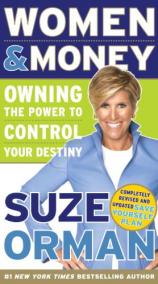Reading Group Guide
Discussion Questions
Women and Money: Owning the Power to Control Your Destiny

1. Do you think gender is a factor in financial management? Discuss the role gender has played, if any, in your personal financial history.
2. Suze says women often have an “unknown factor,” a “fundamental block” that prevents us from doing the right thing with our money. Can you identify some of these factors in your own life?
3. Suze believes that while women are expert at nurturing all kinds of relationships in their personal lives and at work, they fail to nurture their money because they have a dysfunctional relationship with it. Do you agree with this theory? Discuss the idea of nurturing your money. Does that approach come naturally to you? Does it force you to look at your finances in a different way?
4. Suze says that how you handle your money is a reflection of how you feel about yourself. Do you see the truth of this in your own life? How?
5. In Chapter Four Suze discusses the idea of putting yourself on sale by undervaluing yourself, your work, and your time. Do you recognize yourself in Suze’s examples? What are some other scenarios that have made you feel undervalued?
6. Identify a time in your life when you’ve made a strong financial move. What motivated you to do it? Did you have to jump any hurdles, and if so, how did you do that?
7. Suze identifies the eight qualities of a wealthy woman in Chapter 5. How many of these qualities do you feel you already possess? Is there a woman whom you consider a role model in financial matters? Does she embody these qualities?
8. Suze points out that in India women sweep their doorsteps every day as a ceremonial gesture to invite Lakshmi, goddess of wealth, into their home. What cleansing changes can you make–physically and mentally–to prepare your life for wealth and abundance?
9. Chapter Six emphasizes that organization equals control. Do you find this principle to be true in your own life? Think of the areas in your life that are organized–do you have control over them? Now think of the areas that are not organized–how do they differ in terms of your control over them?
10. Suze wants every woman to have a savings account in her own name. Discuss the symbolic and practical importance of this. If you do not already have one, do you foresee any difficulties in opening one? Will the conversation you have with your spouse or partner be difficult? Is there an internal, emotional hurdle you’ll have to clear to accomplish this? Was there ever a time when you drew on the resources of such an account — or wished you had one?
11. Statistics show more than 50% of women have Bag Lady Syndrome–the fear that one day they will end up penniless and homeless. Why do you think this anxiety is so rampant? Have you ever had these thoughts?
12. In Chapter 8, Suze emphasizes the power that comes when a woman states her full name, with pride and confidence. Have you done the exercise in this chapter? If so, what feelings did it evoke in you? Power? Shame? Pride? How do you present yourself to others, and what do you think people see when they meet you? Discuss the concept of “owning your power” — what do you think it means in practical terms and do you feel confident you can achieve this state?
Women and Money: Owning the Power to Control Your Destiny
- Publication Date: February 27, 2007
- Hardcover: 255 pages
- Publisher: Spiegel & Grau
- ISBN-10: 0385519311
- ISBN-13: 9780739487419







